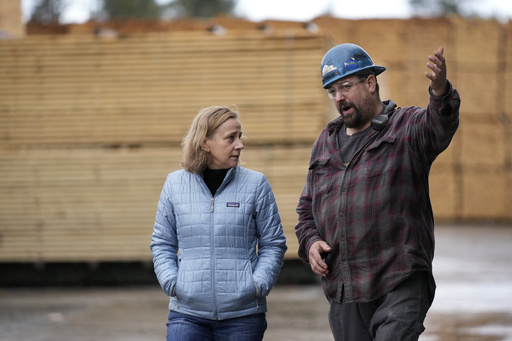CONCORD, N.H. — The race for governor in New Hampshire is becoming one of the most intense, personal political contests in the nation. Though none of the country’s twelve current female governors are campaigning for reelection, five women have emerged as prominent major party candidates across four states. In New Hampshire, the competition is particularly fierce between Republican Kelly Ayotte and Democrat Joyce Craig, both vying to take over from incumbent Governor Chris Sununu, who is stepping down after serving four consecutive terms.
Voters in the state, along with the candidates, suggest that gender is not a central issue, given New Hampshire’s history of electing women to significant positions. However, this dynamic has shaped their discussions on abortion and reproductive healthcare. Both Ayotte and Craig have released campaign advertisements revealing their personal struggles with miscarriages following medical examinations where there were no fetal heartbeats.
“I understand firsthand what it feels like to have your dreams shattered and the anxiety of not knowing if you can have a baby,” Ayotte commented, leveraging her experiences as a former U.S. senator and state attorney general.
In contrast, while Ayotte’s advertisements emphasize her support for in vitro fertilization, Craig’s campaign advocates for more expansive protections of reproductive rights. “I managed to terminate my pregnancy without outside interference,” Craig stated, emphasizing her belief that decisions concerning a woman’s body should be made by the individual, not by politicians.
In Indiana, the situation mirrors that of New Hampshire, with Democrat Jennifer McCormick standing out as the race’s only female contender. She has made her gender a focal point in her criticisms of her Republican rival, U.S. Senator Mike Braun, particularly his support for the state’s stringent abortion restrictions. During a recent debate, McCormick declared, “I am the only candidate here who has experienced pregnancy and childbirth. I have firsthand experience with the complexities of pregnancy. I trust women and their healthcare providers to make the right decisions.”
However, in New Hampshire, Craig often references Ayotte’s past support for a federal abortion ban after 20 weeks and her involvement in the confirmation of Justice Neil Gorsuch, who voted to overturn Roe v. Wade. “Her statements on reproductive freedom are questionable because of her voting history on these issues,” Craig remarked in an interview.
Ayotte has assured voters that she would oppose any further abortion restrictions in a state that implemented a ban after 24 weeks in 2021. “I am not going to change our existing laws,” she asserted. “It’s clear what my stance has been on this issue.” Regarding her credibility, Ayotte pointed out that she was elected to the Senate and previously appointed by governors from both parties to act as state attorney general.
New Hampshire has a remarkable record of electing women, including being the first state to have an all-female congressional delegation. It also made history with a female governor, state Senate president, and House speaker serving simultaneously, and produced the first woman to have served concurrently as both governor and U.S. senator in Jeanne Shaheen. This record has positioned New Hampshire as an anomaly in the country’s political landscape, according to Linda Fowler, a professor emerita at Dartmouth College.
Fowler notes that while voters generally feel comfortable electing women as representatives, they often associate governors with a more traditionally masculine image, as seen with CEO roles. With both candidates being women, it remains essential for each campaign to energize their supporters, particularly around the issue of abortion, which has mobilized a significant turnout for Democrats.
Per the Rutgers Center for American Women in Politics, a total of 30 Democratic and 19 Republican women have served as governors across 32 states, but the current political climate is unique, possibly leading to a historic number of 13 women serving as governors if other candidates are successful.
Despite the significance of gender in the race, both Ayotte and Craig indicated that it has not been a prevalent theme on the campaign trail. Various voter interviews reveal that many do not focus on the gender aspect of the candidates. For instance, Rachel Johnson, a Republican supporter of Ayotte, emphasized her aim to vote based on competency rather than gender. “I’m looking for the best candidate for the job, and gender is irrelevant,” she stated.
Victoria Hill, who intends to vote for Craig, echoed similar sentiments, highlighting Craig’s focus on education and criticizing Ayotte’s fluctuating support for former President Trump. “She seems to change her views based on public opinion rather than staying grounded,” Hill remarked.




